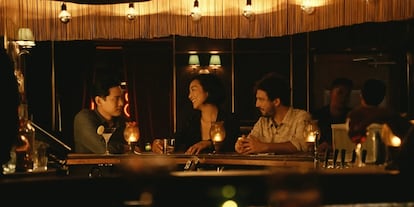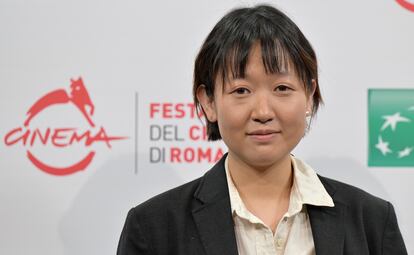‘Past Lives’, the indie film that seems poised to become an Oscar contender
Playwright Celine Song makes her film debut with a comedy about unfinished loves and lost identities based on her experience as a Korean in New York


Is there such a thing as nostalgia for a future that never happened? There is, and playwright Celine Song discovered it one evening sitting in the middle of a triangle completed by her husband, writer Justin Kuritzkes, in a T-shirt, and a Korean engineer, in smart casual attire. They were drinking at the bar of Please Don’t Tell, a New York speakeasy. “I noticed the other customers in front of me, and thought about what questions they would be asking. Like, who was the husband? Was the other guy a lover? Really, what each of us meant to the other two. Suddenly, I felt that answering that question alone was an easy way out, it didn’t show all the intricacies of the truth, and therein lay the germ of a story. I was telling different friends that anecdote, and depending on their background and culture, each one had very different approaches to that moment,” she says with a chuckle. “In addition, through that woman, who was already fictionalized, I could dive into the nostalgia of a future and a relationship that could have happened but didn’t.”
Our interview with Song, 35, took place in September, during the San Sebastian Festival. Her directorial debut, Past Lives, was part of the Festival’s Perlak section, which gathers the best films of the year. The movie had already been screened at the beginning of 2023 at Sundance and the Berlin International Film Festival. At the beginning of awards season (and following the first announcements of nominations for awards such as the Gotham Awards for independent cinema), Song’s movie is the indie title with the best chance of entering the Oscar race. “Please, one step at a time,” Song says. “What’s been exciting has been the journey of turning a personal moment, which could have interested only me, into a story with universal appeal. And [the fact] that this piece of art that plays with fiction and biography appeals to so many people makes me feel less alone,” she explains. There is room for more people at that bar, which is reflected on screen a la Edward Hopper.

Past Lives is also based on a culture clash. The main character, Nora, has known Jung Hae Sung since they were both children. They remain close friends until her family emigrates to Canada at the beginning of her adolescence. Eventually, thanks to social media, they meet again: Nora goes on to be a playwright in New York, while Hae Sung climbs up the corporate ladder at an engineering company. She has diluted her Korean past; she feels the soul of the Big Apple in her veins. He fulfills the masculine expectations of his native Korea: the cult of a muscular body, reservedness and an inability to express feelings... He shares this apparent coldness with Nora, who makes one thing clear: she will never return to Seoul, where she would be reduced to the role of “wife of.” Song has a close-to-biographical explanation of this portrayal of a non-love: “I can only defend myself by saying that this is how love affects my own life, in a less passionate way than the Latin one, right? I was interested in the fact that a relationship is hidden beneath the appearance of a love triangle... which is neither a triangle nor amorous,” she notes, although on screen they end up meeting during the Korean’s week-long trip to New York.

As the director points out, “there is no fight over the girl, nor will she choose one over the other.” She says that is not her style, with which she has already carved out her reputation as a playwright: “What I know about is life’s connections, illustrating what happens emotionally on a day-to-day basis, when sometimes you trace relationships that you don’t even know what to call. What do you call that kind of romance?” This is not Letter from an Unknown Woman, the Stefan Zweig novel that Max Ophüls adapted into a film; it may sound more like Wong Kar-Wai’s In The Mood For Love. “There is something of me in all three characters, because in the end all three are questioning who they are, what their identity is. For me, identity is not a monolith, but a fluid feature that is constantly changing,” Song says very seriously. “I am not Nora, I am Past Lives, I am a woman, I am an immigrant, I am who I was when I emigrated at 12, who I could have been and wasn’t, and also who I am now. I don’t know myself better than I did when I was 16 and at the same time I am far from that age. I am a contradiction.”
Song bursts into laughter when asked if her film doesn’t become two very different films depending on the viewer’s age. “Sure, or if you’ve just broken up with your partner or if you’ve never been in love, or what[ever] your life has been like… Past Lives can even be seen as a feature film about friendship. Or about how each of these men possesses a key, an access to Nora that the other will never get. Both yearn for the other’s vital key. And in reality Nora is a polyhedral whole,” as John Cale’s song You Know More Than I Know underscores on screen.

Early on, Song understood that the film medium was going to be completely different from theater. “Luckily, I didn’t mess around with it. On stage every night you build a ship that sails eight times a week. It’s not about doing it once masterfully; it’s about being consistent each time. Film is different: we capture the moment, we catch the ephemeral, and that’s not possible in theater. For example, I kept the two male actors [Teo Yoo and John Magaro] away from each other on set so that they would meet in the first scene when their characters meet. So that there would be surprise, shock.”
As a cinematic reference, she drew on My Dinner with André, a film about two old friends who discover over dinner how different their visions of life are, which also talks about theater. “And Breaking the Waves, because of the interrelationship between the main character and the camera. Well, that has a lot to do with the philosophy that emanates from Past Lives: we are living our lives as time goes by, and from time to time you will have revealing moments that give meaning to this journey.” Before moving on to another question, she jumps in to add another influence: “Ah, and Working Girl! Because there’s a female protagonist chasing her dream.”

Our chat touches on truly indie New York cinema, that of Tom DiCillo and Jim Jarmusch, “from the 1990s, when ordinary people were filmed in the street”; on what it means to grow old, and when a film director realizes that she is indeed a film director (Song’s answer: “Only after the first ‘action’”). Finally, as another question of identity, we ask whether she, as someone who has lived in North America, between Canada and the U.S. for longer than she lived in her native country, feels close to the Korean cinema that has triumphed around the world: “Yes, I was born in Korea, I have felt the echo of those films much more than I could imagine, and that is why my film is not very or little Korean, but both.”
For the record, Song and Kuritkes (a playwright and novelist turned screenwriter for Luca Guadagnino’s Challengers, which stars Zendaya, and Queer, an adaptation of William S. Burroughs’s novel) remain together. “We got married in 2016 and still live in New York. There were no Korean doubts.”
Sign up for our weekly newsletter to get more English-language news coverage from EL PAÍS USA Edition
Tu suscripción se está usando en otro dispositivo
¿Quieres añadir otro usuario a tu suscripción?
Si continúas leyendo en este dispositivo, no se podrá leer en el otro.
FlechaTu suscripción se está usando en otro dispositivo y solo puedes acceder a EL PAÍS desde un dispositivo a la vez.
Si quieres compartir tu cuenta, cambia tu suscripción a la modalidad Premium, así podrás añadir otro usuario. Cada uno accederá con su propia cuenta de email, lo que os permitirá personalizar vuestra experiencia en EL PAÍS.
¿Tienes una suscripción de empresa? Accede aquí para contratar más cuentas.
En el caso de no saber quién está usando tu cuenta, te recomendamos cambiar tu contraseña aquí.
Si decides continuar compartiendo tu cuenta, este mensaje se mostrará en tu dispositivo y en el de la otra persona que está usando tu cuenta de forma indefinida, afectando a tu experiencia de lectura. Puedes consultar aquí los términos y condiciones de la suscripción digital.








































